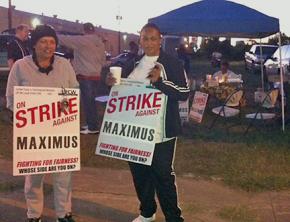Roasting a bad offer
reports on the ongoing strike at Houston's Maximus Coffee Group.
SOME 90 percent of the 250 unionized workers at Maximus Coffee Group on Houston's East Side have been on strike since October 10.
The 250 workers, who are represented by United Food and Commercial Workers (UFCW) Local 455, voted to go on strike after the company refused to back down from its proposal to slash pay and benefits in contract negotiations. Maximus is proposing to cut pay for the workers, who make $16-25 an hour, by 25 to 50 percent; eliminate overtime pay; reduce company 401k contributions; and switch employees' health care plans from a union-controlled plan to a company-controlled plan, with an immediate doubling of health care premiums.
Maximus does the processing, roasting and packaging of coffee beans for sellers like Folgers, and also performs tasks such as decaffeination and mixing of powdered beverages.
Workers have been picketing the plant in shifts around the clock. In the beginning of the strike, they successfully blocked the truck exit and entrance gates, preventing material from being transported in or out until a truck driver called police to complain.

Picket lines since then have had a congenial atmosphere, with a handful of strikers frying catfish while others hold signs outside the gates. Also hanging outside the gates is a homemade voodoo doll made to represent plant owner Carlos De Aldecoa, known in Houston as "the Coffee King," the scion of a wealthy Spanish coffee dynasty.
According to Maximus workers and UFCW officials, Aldecoa's goal is not just to cut pay, but to demoralize and ultimately break the union, which already agreed to a two-tier wage structure in contract negotiations two years ago. A Houston Press article from 2009 details Aldecoa's ongoing efforts to turn Houston into a world-class coffee port, including a successful campaign to exempt the Port of Houston from a state tax on raw coffee beans stored in Texas. His, and the Greater Houston Coffee Association's, vision does not, of course, include unionized workers.
"I've worked at this plant for 41 years and for Maximus Coffee since 2006 when they purchased the plant from Maxwell House," employee Robert Barnes said in a statement. "I haven't gotten a real raise since 2009 and don't know how I'll be able to support my family if my wages and benefits are reduced."
WORKERS ARE optimistic about the strike, and note that Maximus has barely been able to maintain production during the walkout, using a combination of scabs and supervisors. The plant has been operating at reduced efficiency, and at times, it's possible to smell burnt beans from the outside. Some scabs have even left the factory after being denied overtime pay.
Family, friends and neighbors of strikers have shown up on the picket line, as well as students from the campus of nearby University of Houston. Convenience stores in the area are allowing strikers to use their bathrooms, and a few local bars and restaurants are offering them reduced-rate food and drinks in solidarity.
However, workers also realize that management is stubborn and has the option of using workers from the nearby Cadeco coffee processing plant, which Aldecoa also owns, in order to break the strike. If and when that happens, the union is prepared to take action at Cadeco.
In addition to coming out to the picket line, workers are encouraging all those supporting the strike to phone Aldecoa to tell him that slashing pay and benefits is unacceptable.


